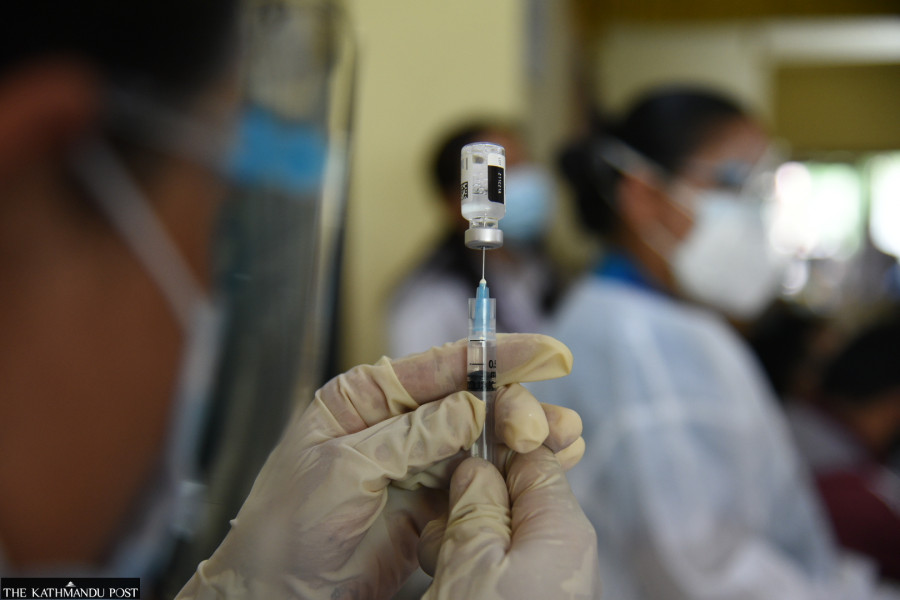Health
Covid-19 jab acceptance highest in Nepal, study finds
The study conducted in Kailali and Kanchanpur shows 97 percent of eligible Nepali population is ready for the vaccine.
Arjun Poudel
Ramesh Pudasaini, a resident of Tarakeshwar Municipality in Kathmandu, took the Johnson & Johnson Covid-19 vaccine on Wednesday, by showing a recommendation letter from a private school.
Though he is only 26-year-old and not a teacher or staff of any school, he requested an acquaintance for a recommendation letter stating that he works at a school so that he qualifies for vaccination.
“Since the start of the vaccination campaign, I tried a lot to get vaccinated but succeeded only on Wednesday,” Pudasaini told the Post. “I came to know that vaccines are the only reliable means to fight Covid-19.”
Pooja Adhikari, a local from Bidur Municipality of Nuwakot, is also not on the priority list prepared by the Health Ministry. But she too got inoculated with the Johnson & Johnson vaccine on Wednesday.
“I also requested an official for a vaccine for my-sister-in-law [Pooja] and she too got inoculated by showing her passport,” said Pudasini. “She is preparing to go abroad for study but it is very difficult for those who are not on the priority list to get a vaccine.”
This was a common refrain of thousands of people, who were not on the priority list but got inoculated somehow, and it also shows how desperate people are for the jabs.
A multi-national study carried out also in Nepal by the Centre for the Study of Labour and Mobility in collaboration with the US-based Yale University shows that Covid-19 vaccine acceptance rate in Nepal is the highest in the world.
The study shows that 97 percent of the Nepalese population, who are eligible for vaccines, are ready to take the jabs.
“Though data was collected in December last year from Kailali and Kanchanpur—two districts from Sudurpaschim Province, it shows vaccine acceptance rate is very high in Nepal,” Arjun Kharel, a member of the research team, told the Post.
People of 1,392 households, selected randomly from 90 villages from the two districts were questioned about their willingness to take the vaccine.
“The study was carried out for a very different purpose—impact of interest-free loans to the families of migrant workers but we also included a topic ‘impact of Covid-19 on migrants,’” added Kharel.
The study carried out in 12 countries of Asia, Africa, South America, Russia and the
United States, in which 44,260 people took part, showed the vaccine acceptance rate is lowest in Russia. The report has been published by Nature.
Vaccine hesitancy has never been an issue in Nepal, and with the second wave of infections, which affected hundreds of thousands of people and killed over 6,500 throughout the country, the vaccine acceptance rate has increased.
Doctors say that almost all eligible people would take the vaccine, if authorities could provide sufficient doses.
“Vaccine acceptance rate is very high in Nepal in regular immunisation programmes also,” Dr Baburam Marasini, a former director of the Epidemiology and Disease Control Division, told the Post. “We can administer the vaccine to a majority of the population in a short time if authorities could arrange for sufficient doses.”
Though the vaccine acceptance rate is high in the developing countries, where study was carried out, Nepal is on top.
The study shows that people in Nepal consider health professionals as the most trusted persons for vaccine-related information.
“People do not question the quality and side effects of the vaccine provided by the government,” said Marasini.
Several countries have been luring people for vaccination by offering them different types of incentives. Authorities in the United States even offered marijuana to those who take Covid-19 jabs.
“We don’t have to offer such things,”said Dr Shyam Raj Uprtei, coordinator of the Covid-19 Vaccine Advisory Committee. “The only thing that the authorities have to do is to arrange for sufficient doses.”
So far, 3,308,730 people have taken their first dose of Covid-19 vaccine and 12,81240 have been fully immunised.
The Health Ministry started administering the single-shot J&J vaccine from Monday. Those aged 50-54 years, differently-abled people, frontline health workers and sanitation workers are the priority groups for the vaccine.
Authorities have also provided the jabs to those who have visas and air tickets but are stuck in the country due to vaccination issues.
Nepal started its Covid-19 vaccination campaign in January with 1 million doses of AstraZeneca vaccine, manufactured in India under the brand name Covishield, that India gave in grant. Nepal has received vaccines also from China, the COVAX facility and the United States in grants. Nepal has also bought 2 million doses of vaccine from India, of which only 1 million jabs have been delivered.
Nepal on Thursday received a second batch of Vero Cell vaccine that the country purchased from China. A Nepal Airlines plane brought 800,000 doses of the vaccine. The government has purchased 4 million doses of the vaccine through a non-disclosure agreement with an affiliate of the state-backed pharmaceutical giant Sinopharm.
The first consignment from China arrived on July 9.




 16.12°C Kathmandu
16.12°C Kathmandu














